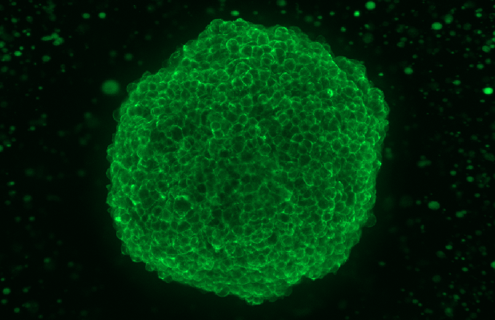
We are at an inflection point in cancer research today. New biological models now more closely mimic the behavior of cancer and are standardized, annotated, traceable, and paired with genomic and phenotypic data. These new advanced cancer models are contributing more valuable and reproducible research results than ever before.
Epithelial-mesenchymal Transition (EMT)
CRISPR-edited EMT and mesenchymal-epithelial transition (MET) reporter cell lines enable real-time monitoring of the transition of cells from epithelial to mesenchymal state (or the reverse) via the expression of red fluorescent protein (RFP)–tagged vimentin or green fluorescent protein (GFP)–tagged E-cadherin.
Human Cancer Models Initiative (HCMI)
As part of our pledge to elevate biological models, ATCC is collaborating with HCMI to offer scientists a wide variety of next-generation 2-D and 3-D patient-derived in vitro cancer models, including organoids, neuronal models, and conditionally reprogrammed cells.
Immuno-oncology models
The development of immunomodulatory drugs and biologics dictates a clear need for human cell-based models to evaluate immune activation. To answer this need, ATCC provides a large collection of fully characterized and authenticated advanced cell models, including checkpoint luciferase reporter cells, CAR-T luciferase reporter cells, and THP-1 reporter cells.
Isogenic Cell Models
Clinically relevant cell models are critical for studies of molecular and cellular mechanisms of tumors, as well as for drug screening for cancer. Using CRISPR/Cas9, ATCC has created isogenic cell lines with mutants of key oncogenes, which are ideal for identifying novel, personalized treatment regimens.
Luciferase
ATCC is bridging the gap between the in vitro and the in vivo by offering luciferase-labeled cell lines for biological mechanism studies and drug development; these advanced models provide a relatively simple, robust, and highly sensitive means to measure biological processes and to assess drug efficacy in live animal models through bioluminescence imaging.
Organoids
Organoids are self-organizing microtissues that serve as invaluable preclinical models for studying cancer and offer many advantages over existing human or non-human animal cancer models.
Explore the advanced cancer models in our collection.
Human Cancer Models Initiative (HCMI)
ATCC is collaborating with the Human Cancer Models Initiative (HCMI) to offer scientists a wide variety of next-generation 2-D and 3-D patient-derived in vitro cancer models, including organoids. These HCMI models are valuable tools to study cancer, identify and target novel therapies, and facilitate translational cancer research.
Explore the collection
Isogenic Cells
Clinically relevant cell models are critical for studies of molecular and cellular mechanisms of tumors, as well as for drug screening for cancer. Using genome editing tools such as CRISPR/Cas9, ATCC has created isogenic cell lines with mutants of key oncogenes, which are ideal for identifying novel treatment regimens.
Get More Info